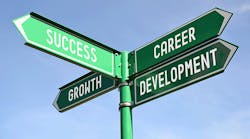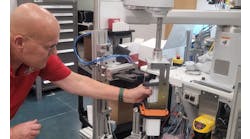I'm often asked for career advice. It's an important topic. I hope this set of guides, developed over the course of my own career in industry and academe, will be helpful to you in developing your fullest potential.
1. Prepare so that doors open
A favorite book for me is David P. Campbell’s If You Don’t Know Where You’re Going, You’ll Probably End Up Somewhere Else. New York Yankees player and coach Yogi Berra is credited with a similar quote.
As a student, do the right things to prepare for a career. Earn good grades, have a plan of study that supports getting the entry level job you seek, and have internships that give you relevant training and career insight. Just as importantly, realize technical skill aren't the only thing that opens doors, so demonstrate your ability to be an effective partner in bringing things to fruition. Participate in diverse extracurricular activities.
For the newly graduated engineer, cross the gap from learning as your objective to focus on doing. Continue to develop needed skills and your ability to be an effective partner for your organization.
2. Learn how to learn
I was originally hired in industry because my degrees gave me the ability to explore applications of radiation-based sensors in process monitoring. But project assignments shifted me elsewhere. However, that first experience introduced me to process control. I never had a course in control, so I had to learn on my own. My next assignment in manufacturing was related to control of product quality. That introduced me to statistical process control (SPC). I never had a course in statistics or SPC, so I had to learn on my own. All through these assignments first-principles understanding and modeling were important, which introduced me to regression—best fitting of models to data—which required validation of data as well as optimization.
You may have guessed what I say next: I never had courses in optimization or data processing, so I had to learn on my own. The message is: the most important skill-related prerequisite for success is your ability to learn what's needed. But on the practice side, focus on bringing application to fruition, not on learning.
In school, professors (and the education system) decide what you are to learn, they teach it, and they test to see how well you learned it. As a professional, you must become your own professor and choose what's necessary to learn, learn it, and self-test to grade your proficiency. Develop this ability of self-guided and self-validated learning what is important to a task at hand. Don’t learn for learning’s sake. Learn for today’s utility.
3. Embrace change
In my 13 years in industry, I had six different assignments. My original plan was left in the past, as many new enjoyable vistas opened, revealing new concepts, and developing the depth and breadth of my knowledge.
Broad experience can be valuable in your bringing innovation to new places. In my academic career, I pursued the use of first-principles models in process control, but unlike most career academics, I understood the application issues because of my industrial experience. I had a knowledge advantage over most academics, including those who far outranked me.
My academic career is substantially built on disruptive innovation, an out-of-the-box perspective on their community. Anything you learn in one place can become an innovative advantage in another.
4. Develop soft skills
Wherever you are, success is mostly about people. Success is through acceptance of you and your work by others. Rarely does something like an Einstein happen—a person working in isolation, publishing a groundbreaking message about relativity. Especially in industry, diverse employees work in teams, and leadership, fellowship, compromise, collaboration, context, listening, feeling, communication and other such human interaction skills are more important than excellence in technical engineering or science. Focus on gaining these “soft” skills.
My voice in the academic community about the real issues related to process control was disruptive to the career reputation built by others academic researchers, who controlled funding and publication acceptance. You need to be aware of the human context and be sensitive to other’s ambitions as your innovation rocks their boats. Your idea isn't as important as getting others to accept it. Nominally, economics and safety are the business considerations. But if rational logic dominated humans, there would not be political disagreement. Understand how to sell your idea within the oft-hidden fears and identity investments of your buyers.
5. Enjoy the path
Success does not happen overnight. I was well into my career before assembling first-principles control approaches that might become practicable. Be patient and continue to pursue. Don't let rejection by others slow you down. Don't be angry about rejection. Stay focused on your vision. Back to Einstein, his Nobel prize came 16 years after his publication of relativity, and it was for “his services to theoretical physics, and especially for his discovery of the law of the photoelectric effect” because relativity was still not well accepted. Many of the world’s most famous artists wait a lifetime for recognition while pursuing their vision.
Enjoy the path to your vision. Once you get it, you’ve got it. But for most of the time, you’ll be on the path to where you are going.
6. Pursue wellness
You must remain physically and emotionally healthy and fit to have the energy and stamina required for achieving success. Understand and pursue personal wellness.
Personal life and professional life are intertwined. If home-life is not happy and energizing, then this will diminish your career success. Also, if your career is not happy and energizing, that will diminish your ability to create a supportive home. As you take care of yourself, take care of your family, which includes your colleagues at work, your spouse, children, siblings, parents, cousins, neighbors and community.
For wellness, you must help all the humans around you to become gracious, safe, self-realizing, kind and healthy. Because you want to live within such an environment, you need to create it. Wellness and creating a desirable environment are as much about others as they are about yourself. Don’t view others as a barrier to your acquisition, as the enemy in competition. Seek "coopetition."
7. Network
Develop friendly associations with those who are your seniors. Don’t be afraid to engage them on a personal level; but also don’t be a pushy bother, demanding their attention by marketing yourself. Contacts and personal visibility can be very helpful in opening doors for you and in relaying helpful techniques to get there.
Become active in professional organizations, such as local ISA or AIChE sections or Toastmasters.
8. Acquire the perspective of others
My first summer job was as a carpet installer’s helper. I learned many skills, most tricky of all was to cut the carpet to lay properly around both in- and out-corners in the wall when the carpet was folded away from the wall. I was very proud of my technical skill. Upon ending the summer, I asked the store owner to write me a letter of recommendation, expecting him to feature my craftmanship and productivity. He did not. Instead, his brief letter said I was a loyal employee and good with customers. I was very disappointed. But, my dad came to tears that his son received this ultimate affirmation of what a valuable employee should be.
Expect others to see the context differently from your view. Let the perspective of others lead you in the right direction.
9. Volunteer
Be willing to do more than you're assigned at work. Volunteer for auxiliary activities that might not be essential business projects. Support your community. Support your profession. People will notice. By doing, you learn (an Alanis Morissette song theme), and the experience will be useful. But don’t volunteer for more that you can handle while meeting necessary personal and employment commitments.
10. Have no fear
George Addair once stated, “Everything you've ever wanted is sitting on the other side of fear.” The clothing company named "No Fear" is also the logo they promote. “Just Do It” is a Nike logo. This doesn't mean go into tasks unprepared. Children learn how to do standing backflips, but not by just going for it. Instead, once they've practiced all the elements and are prepared, then it's safe and doable (even though it remains scary for a while). Public speaking, difficult conversations, buying a house, and such are all fearful. Be prepared. Then you can.






